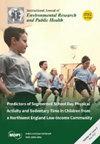父母的营养知识对儿童口腔健康相关生活质量的影响
3区 综合性期刊
Q1 Medicine
International Journal of Environmental Research and Public Health
Pub Date : 2024-09-08
DOI:10.3390/ijerph21091190
引用次数: 0
摘要
家长可以通过鼓励儿童健康饮食,帮助他们在童年早期养成良好的饮食习惯。众所周知,父母的营养知识水平对儿童的健康营养起着重要作用,而健康饮食对提高与口腔健康相关的生活质量(OHRQoL)也至关重要。由于父母营养知识水平对儿童口腔健康相关生活质量的影响尚不清楚,本研究旨在探讨父母营养知识水平对儿童口腔健康相关生活质量的影响。这项研究的对象是居住在土耳其中部安纳托利亚地区的 459 名 3-6 岁儿童的父母。数据收集工具包括社会人口学表格、幼儿口腔健康影响量表(ECOHIS)和成人营养素养评估工具(EINLA)。数据用 SPSS 软件进行分析,采用学生 t 检验、卡方检验和二元逻辑回归模型。营养素养较高的父母往往受教育程度较高。营养知识总分的增加,尤其是一般营养知识(GNK)和食品标签与数字知识(FLNL)分量表的增加,与儿童 OHRQoL 的提高有关。提高父母的营养知识水平可以使他们成为子女的好榜样,从而有助于提高他们的 OHRQoL。因此,提高父母的营养知识水平可以通过改善儿童的营养状况来提高其 OHRQoL,并可被视为口腔健康的保护因素。本文章由计算机程序翻译,如有差异,请以英文原文为准。
The Effect of Parents’ Nutrition Literacy on Children’s Oral-Health-Related Quality of Life
Parents can help children adopt good eating habits early in childhood by encouraging them to eat healthy. While parents’ levels of nutritional literacy is known to play a role in children’s healthy nutrition, healthy food is also essential in improving oral-health-related quality of life (OHRQoL). Since the effect of parents’ nutritional literacy on children’s OHRQoL is not yet known, this study aimed to examine the impact of parental nutritional literacy on children’s OHRQoL. This study was conducted with 459 parents of children aged 3–6 living in the Central Anatolia Region of Türkiye. Data collection tools included a sociodemographic form, the Early Childhood Oral Health Impact Scale (ECOHIS) and the Evaluation Instrument of Nutrition Literacy on Adults (EINLA). Data were analyzed in SPSS, using Student’s t-test, Chi-square test, and binary logistic regression models. Parents with higher nutritional literacy tend to have higher levels of education. An increase in total nutritional literacy score, especially in the general nutrition knowledge (GNK) and food label and numerical literacy (FLNL) subscales, was associated with higher child OHRQoL. Increasing parents’ nutritional literacy levels can contribute to OHRQoL by enabling them to be good role models for their children. Therefore, increasing parents’ nutritional literacy can improve OHRQoL by improving children’s nutrition and can be considered a protective factor for oral health.
求助全文
通过发布文献求助,成功后即可免费获取论文全文。
去求助
来源期刊

International Journal of Environmental Research and Public Health
Medicine-Public Health, Environmental and Occupational Health
CiteScore
7.30
自引率
0.00%
发文量
14422
审稿时长
1 months
期刊介绍:
International Journal of Environmental Research and Public Health (IJERPH) (ISSN 1660-4601) is a peer-reviewed scientific journal that publishes original articles, critical reviews, research notes, and short communications in the interdisciplinary area of environmental health sciences and public health. It links several scientific disciplines including biology, biochemistry, biotechnology, cellular and molecular biology, chemistry, computer science, ecology, engineering, epidemiology, genetics, immunology, microbiology, oncology, pathology, pharmacology, and toxicology, in an integrated fashion, to address critical issues related to environmental quality and public health. Therefore, IJERPH focuses on the publication of scientific and technical information on the impacts of natural phenomena and anthropogenic factors on the quality of our environment, the interrelationships between environmental health and the quality of life, as well as the socio-cultural, political, economic, and legal considerations related to environmental stewardship and public health.
The 2018 IJERPH Outstanding Reviewer Award has been launched! This award acknowledge those who have generously dedicated their time to review manuscripts submitted to IJERPH. See full details at http://www.mdpi.com/journal/ijerph/awards.
 求助内容:
求助内容: 应助结果提醒方式:
应助结果提醒方式:


